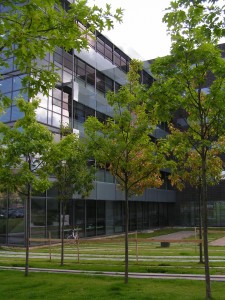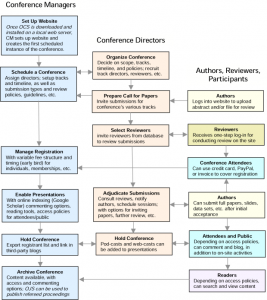NOTHING IN SCHOLARLY COMMUNICATION MAKES SENSE EXCEPT IN THE LIGHT OF OPEN ACCESS – Leslie Chan
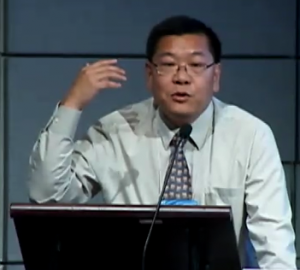
Abstract
This year marks the bicentennial of Darwin’s birthday, and the sesquicentennial of the publication of “The Origin of Species”. 2009 also marks the 20th anniversary of the invention of the Web by Tim Berners-Lee. These momentous occasions provide a fitting opportunity to reflect on how the conception of scholarly communication and scientific discoveries have evolved from the time of Darwin to the present. Using the publication of “The Origin” and the subsequent acceptance of the theory of evolution as a case study, we look at how new knowledge was formalized from the vast amount of data collected by Darwin, his prodigious private correspondence and personal notebooks, into the public record in the form of books, journal articles, and public lectures. I argue that just as evolution provides an overarching and coherent framework for organizing and making sense of biological diversity, the Web and open access are providing unprecedented opportunities for the framing and reframing of scholarly inquires, and calling into question the nature of authority in the knowledge production process. I will provide examples to show that just as species are mutable, so too are knowledge domains, authority, and disciplinary boundaries in the open and generative web environment.
July 16, 2009 Comments Off on NOTHING IN SCHOLARLY COMMUNICATION MAKES SENSE EXCEPT IN THE LIGHT OF OPEN ACCESS – Leslie Chan
Open Journal System Adaptation to Postsecondary Education Improvement Programs: A Brazilian Experience – The Session Blog

(under her permission)
Presenter: Jeanne Dobgenski, Scientific Initiation Program Manager, Anhanguera Educational S. A.
Friday, July 10, 2009, 9:30 pm-10:30 pm. SFU Harbour Centre. Room 2250
Session Overview
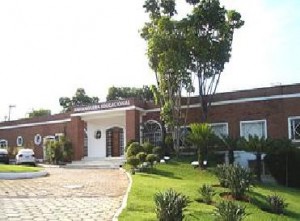
Instituto de Pesquisas Aplicadas e Desenvolvimento Educacional (AESA)
Anhanguera Educational S. A. (AESA) is the largest postsecondary educational institution in Brazil. AESA launched the integration project its Scientific Initiation Program (PIC) and Professor training program (PICD) with Open Journal System (OJS). PIC is for undergraduate student scholarship program dedicated to develop scientific skills with high graduation effectiveness. Students submit their paper through OJS. Then, the PIC manager sorts out documents according to the categories and sends to reviewers. These reviewers are advisors of the students in the same areas. Therefore, the students (authors) can have chance the report to be reviewed by other than their own advisor. 156 authors and 115 reviewers currently enrolled. The reviewers send the papers to the manager again with recommendation for the paper. With this process, the authors have chance to edit their papers and have information how to write a scholarly research-oriented paper.
Following is the workflow chart of the research project process (from Dobgenski with permission):
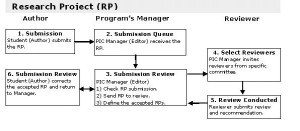
The PIC operational process is divided into the following 5 stages:
1. Research Project → 2. Partial Report → 3. Partial Article →
4. Final Article (FA) → 5. Student Yearbook (SY)
This whole Anhanguera´s PIC management cycle takes a year. After getting through all the process until stage 5, Student Yearbook is available in OJS.
Following is the workflow chart of the student yearbook process (from Dobgenski with permission):
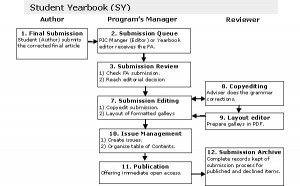
Dobgenski commented AESA uses OJS not only to gather information but also to give students chance to publish their own research. In that way, the integration PIC program with OJS is very practical since it gives chance students to receive feedback of their writing and also produce their own papers. Undergraduate students used to have a role as an information receiver rather than an information producer, but this program helps students publish their own paper as a producer.
AESA also uses OJS for professors training programs (PICD) of which process is:
1. Professor ask for support/budget by application form
2. Campus Director authorizes the application
3. Application’s form is sent to PICD agency
4. PICD agency analyzes and returns final agreement
5. Professor receives agreement confirmation
6. The process is terminated
The session of Dobgenski showed the practical use how OJS facilitates academic and institutional programs. Dobgenski, a manager of AESA, mentioned through her e-mail the management of documents and users associated with an improvement program could become a quite challenging problem. There are a huge number of specific constraints interrelated with scheduling tasks, publishing rules and norms conformance. It is necessary to adopt computer-aid system to keep track of all the information workflow and to guarantee these constraints satisfaction. OJS was very useful tool to allow the manager to setup a minimal-path procedure for electronic publishing. The OJS web system permits create, manage and interact with a huge community around these programs. In 2009, Anhanguera’s PIC received more than 300 project submissions. The presenter emphasized OJS helps run PIC and PICD programs smoothly with a small number of faculty members (4 professors, 1 computer systems analyst, 1 administration assistant).
The Anhanguera’s experience shows that the OJS software permits a considerable spread community formed by students, professors, researchers, managers and academic decision-makers get organized and integrated to improve these programs.
Related Links
Anhanguera Educational S. A.: http://www.unianhanguera.edu.br/anhanguera/
Open Journal System: http://pkp.sfu.ca/?q=ojs
July 14, 2009 7 Comments
Using the Open Journal System to Discuss Human Development and international Cooperation: the Experience of Universitas Forum – The Session Blog
Presenter: Roberta Pellizzoli
Friday, July 10, 2009, 11 pm-12 pm. SFU Harbour Centre. Room 2250
Who is the presenter?
-
Contract professor, Political and Economic Geography of sub-Sahara Africa at University of Bologna, Faculty of Political Science
-
Editorial Administrator, Universitas Forum: International Journal on Human Development and International Cooperation
Session Overview
What is Universitas Forum?
Universitas Forum is peer-reviewed international electronic journal on human development and international cooperation. The aim of Universitas Forum is to offer critical analyses of current approaches to international development cooperation and practice-based research concerning global and local human development such as poverty, health, water shortage, education, inequity, social exclusion, to name a few (see Human Development Resource (HDR net) for more information). The journal is conceived as a tool for encouraging the systematization of local experiences, with the contribution of local journalists and academics. First volume with four issues was published in 2008, and a further three issues are planned for 2009. The journal provides four languages: English, Spanish, French, and Italian. The full text of articles is in the original language, while abstracts are translated. Universitsas Forum is produced by the Universitas programme of the ART initiative. The journal is sponsored by UNOPS.
What is the role of Universitas Forum?
Swartz (2008), the coordinatior of the ART Universitas Programme and of the editorial committee of Universitas Forum, argues that previous development model such as globalization or capitalism createdscompetition and social exclusion rather than cooperation. Moreover, unbalanced distribution of resources and unequal opportunity to contribute between Northern and Southern actors are also barriers on human development. Therefore, an alternative model on human development is urgent.
Universitas Forum was produced under the goal of following:
1. Enhancing resources of local communities and their human development potential
2. Mutual respect and learning, development cooperation of knowledge between North and South
3. A systematization of the experiences of the many actors involved in human development practice
4. Increasing opportunities for accessing and disseminating knowledge of researchers, policy makers or practitioners on human development
However, according to Pellizzoli, the presenter, there are some difficulties the journal is facing:
• Arouse the interest of development practitioners
• Link theoretical knowledge with socially embedded research and practice
• Diversify audience (geographical, institutional, etc)
• Involve local researchers in order to increase the visibility of views from the South
• Increase the number of readers
• Promoting the idea of a public right to knowledge
In addition, she also stated the challenges of Open journal system (Open-Source Publication software of the Universitas Forum for open access). She argued that to improve democratic access to OJS knowledge, English should not be assumed the standard language when dealing with a multilingual journal. Not everyone is a native English speaker, and the fact that English is the default language makes navigating the site more difficult for those who are not native English speakers and not highly computer literate. Although OJS provides several languages (e.g., Chinese, Dutch, Farsi, Japanese, Spanish, etc.) other than English, poor translation is an issue. Moreover, those who do not have high computer skill may be discouraged to use the system.
Therefore, Pellizzoli suggested OJS should be improved, especially in translation, as a multilingual journal. Besides, small grants for researchers from the South should be given to promote systematization of innovative practices and experiences. She also urged that networking with other OJS publications (see here for more open journals) is crucial. Finally, more workshops should be available to create knowledge on human development.
Related Links
Afriche e Orienti: http://www.comune.bologna.it/iperbole/africheorienti/english/rivista.html
Art initiative: http://www.art-initiative.org/
Human Development Resource: http://www.yorku.ca/hdrnet/index.asp
Open journal system: http://pkp.sfu.ca/?q=ojs
Universitas Forum: http://www.universitasforum.org/index.php/ojs/index
UNOPS: http://www.unops.org/english/Pages/default.aspx
Reference
Swartz, S. (2008). Knowledge for human development, Universitas Forum, 1(1). Also available at http://www.universitasforum.org/index.php/ojs/article/view/15/48
July 14, 2009 Comments Off on Using the Open Journal System to Discuss Human Development and international Cooperation: the Experience of Universitas Forum – The Session Blog
Scholarly publishing in Africa: the online potential, the online challenge
Session: Scholarly publishing in Africa: the online potential, the online challenge
Presenter: Samuel Smith-Esseh (University of British Columbia)
Abstract: To improve our current largely anecdotal understanding of scientific publishing in Africa, this empirical study was conducted, involving active participants within the scholarly community – authors, editors, publishers, graduate students, faculty, scientists, librarians, IT staff and university administrators. The data is reviewed in light of the opportunities arising from technological progress, particularly the Internet … and how this speaks to the all important issue of expanding knowledge resources in Africa to the benefit of the global scholarly community.
Overview
Smith’s presentation introduced findings from a quantitative study into journal publishing in Africa, where African journal editors and publishing teams gathered at several universities throughout Africa to contribute as research participants. The numbers illustrate the many challenges which characterize the academic journal publishing environment in Africa. Smith concluded that a key priority is to look at the issue of cost: there are a variety of economic models improvised in Africa, but no standard effective model in use. Despite the financial constraints, there are also promising developments, namely, the early impacts resulting from the advent of the internet, as shown for instance, by high numbers of online journal reading and the cost-saving opportunities presented by online publication.
Snapshot of the Issues
– African scholarship is poorly distributed and poorly assessed
– A major problem lies in the regularity of journal publication: there are frequently breaks in publication schedules (75% of journals in the study have had a break in publication). The three top reasons for breaks included:
1. Financial constraints
2. Perception of human resources
3. Lack of article submissions
– A common category for journals included ‘campus-wide’, journals that multi-disciplinary, circulated within a university, because the university is not able to sustain departmental or disciplinary journals.
– Factors in authors’ choice of which journal to publish include appropriate subject scope (83.%), institutional legitimization (77.8%), international journal (68.7%), prestige of journal (44.4%); others.
– Local publishing is greatly impacted by the northward-focus of African authors. There is pressure on African academics to publish internationally, thus local publishing industries are neglected.
– Editorship in Africa is male-dominated.
– There are no professional training opportunities or systematic training in editorial management and in the peer review process. Some other challenges in reviewing journals include an overburdened academic research community and a lack of subject area expertise within some disciplines.
– Many institutions are not buying into the open access for a variety of reasons, which include technical challenges, human resource issues, quality assurance, ideological reasons, economic challenges, and regulatory and policy challenges.
Economic challenges
– Subscription rates simply put journals out of reach of many African scholars: rates are equal to what some professors earn as a salary.
– Most journals depend on university support and are published within the university.
– There is a dependence on international sponsorship
– Print production is very expensive in Africa (highest costs include: staff, printing, postage, editorial expertise, editors’ stipend, photocopying, etc). However, the internet has the potential to greatly minimize some of these costs.
– Connectivity is gradually improving in Africa, yet the cost remains prohibitive.
Where does potential lie?
– Significantly, Smith’s study found the primary incentive for the continued publication of journals when there is no economic incentive to be reputation. There is thus an important level of drive evident, something which can resource further developments.
– There is growth in circulation numbers of scholarly journals.
– There has similarly been a perception among the editors of an increase in submissions (84.4%), while 10.4% perceived a decrease in submissions, and 5.2% were not sure.
– Another study found almost 0% of submissions to African journals came from outside of African countries. However, because of the internet, this study found that that is changing. African journals are becoming more visible. Editors perceived an increased international readership (41.8%).
– AJOL confirmed this finding, when their data was consulted, to confirm what Smith found in his study. AJOL’s geographical distribution of document deliveries shows that people from outside the continent are beginning to read journals published in Africa. There has been a 1,343% increase of readership in Asia over one year.
– Academic reading habits are showing the impact of the internet: online journals had the highest readership among the study participants, suggesting their currency as the main information source for scholars.
Further Reading:
The Scholarly Journal in the Production and Dissemination of Knowledge on Africa: Exploring Some Issues for the Future (2001) S.A. Adebwole
African Journals Online: improving awareness and access (2002) D. Rosenberg
Participation in the global knowledge commons (2005) L. Chan and S. Costa
Transforming Access to Research Literature for Developing Countries (2005) B. Kirsop and L. Chan
July 14, 2009 Comments Off on Scholarly publishing in Africa: the online potential, the online challenge
IBERO-AMERICAN SYSTEMS FOR THE DISSEMINATION OF SCHOLARLY JOURNALS: A CONTRIBUTION TO PUBLIC KNOWLEDGE WORLDWIDE – Ana Maria Cetto
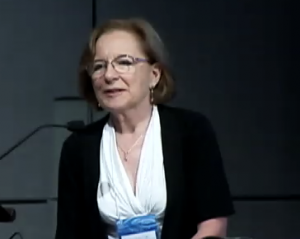
Ana Maria Cetto - PKP conference 2009
Abstract
A vast amount of scholarly journals are edited in the countries of Latin America and the Iberian Peninsula, altogether providing a rich picture of the scientific production in these countries. However, these journals have traditionally not been part of the international mainstream. Different solutions have been sought to increase their access and visibility, using both existing information systems and developing new systems tailored to the needs of the region.
A detailed analysis is made of the presence of Ibero-American journals in the international information scene, and of the efforts to increase their visibility by editors and publishing institutions. Further, an account is presented of the major online information systems developed in the region. The main features of these systems are discussed (including search facilities and free access to journal contents), and how they have influenced editorial practices throughout the region.
Some conclusions are drawn on the challenges that Ibero-American journals face as they seek to strengthen their presence in the international scene.
Click the link below to load the video archive of the plenary session.
July 13, 2009 Comments Off on IBERO-AMERICAN SYSTEMS FOR THE DISSEMINATION OF SCHOLARLY JOURNALS: A CONTRIBUTION TO PUBLIC KNOWLEDGE WORLDWIDE – Ana Maria Cetto
SCHOLARLY COMMUNICATION IN THE AGE OF THE COMMONS – A SOUTHERN PERSPECTIVE – Subbiah Arunachalam
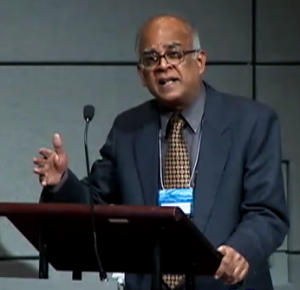
Subbiah Arunachalam - PKP Conference 2009
Abstract
The contours of the geography of science and scholarship have been changing and the change is likely to be even more pronounced in the years to come. The dominance of the advanced countries of the West is eroding and the erstwhile colonies are no longer content to remain hunting grounds for safari science. Some of them are unwilling to play second fiddle to science in the advanced countries any longer and want to be equal partners.
The need for science to be performed everywhere and take roots in all countries is now well recognized.
The toll-access journal system that was set up some 350 years ago and which has served well till a few decades ago evolved, for historical reasons, largely to serve the needs of North-North knowledge exchange and have failed to take cognizance of the aspirations of the South. In addition, the spiraling costs of journal subscriptions have effectively locked researchers from the South out of access to new knowledge and the much-needed international dialogue, thus making the notion of universality of knowledge and science a distant ideal and not a practicable goal.
Even advocates of open access do not fully recognize how important it is today for scientists in the North to learn about developments in the South. The value of South-to-North flow of knowledge was well demonstrated by what happened during medical disasters such as avian flu and swine flu when speedy exchange of not only research results but also research data enabled dealing with the disasters quickly.
Open access to knowledge is not merely important in science but also in development. Organizations such as IDRC and to some extent DFID support open access to all the reports from development projects they support.
If OA is so very important to the South, why is the progress slow? While computers, internet access and bandwidths continue to pose problem in a number of southern countries, in general the situation is improving. The more importan factor is scientists’ apathy. Scientists in the South, by and large, do not exercise their rights to the full; often they give away on a platter copyright to their research papers to journal publishers. The publishers themselves indulge in practices that would entice publishing scientists and librarians to act in ways that would benefit the publishers. Funding agencies and goverments of southern countries are not as proactive as they should be.
Focused advocacy on the advantages of the public commons approach can bring about some revolutionary changes. Such advocacy should be aimed at all levels of stakeholders. Some examples of what is being done in India will be presented.
Click the link below to load the video archive of the plenary session.
Scholarly communication in the age of the commons – A southern perspective
July 13, 2009 Comments Off on SCHOLARLY COMMUNICATION IN THE AGE OF THE COMMONS – A SOUTHERN PERSPECTIVE – Subbiah Arunachalam
SCHOLARLY AND RESEARCH COMMUNICATION: A JOURNAL AND SOME FOUNDING IDEAS – Rowland Lorimer

Rowland Lorimer - PKP Conference 2009
Abstract
This paper introduces a new journal Scholarly and Research Communication. It does so against a background of the desire to maximize the dissemination and impact of research, a goal that complements public investment in research. The paper reviews developments in commercial publishing with special emphasis on the emerging legal relationships between publishers authors and users. Second, it provide an overview of developments in non-commercial scholarly publishing – where things now stand. Third, it identifies what I see as a needed rationalization of functions. Fourth, it introduces to you Scholarly and Research Communication as a venue for research and technical inquiry.
Click the link below to load the video archive of the plenary session.
SCHOLARLY AND RESEARCH COMMUNICATION: A JOURNAL AND SOME FOUNDING IDEAS
July 13, 2009 Comments Off on SCHOLARLY AND RESEARCH COMMUNICATION: A JOURNAL AND SOME FOUNDING IDEAS – Rowland Lorimer
PUBLISHING FOR A GLOBAL CULTURE – Ngũgĩ wa Thiong’o
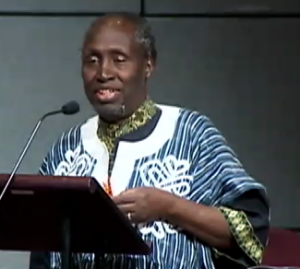
Ngũgĩ wa Thiong'o - PKP Conference 2009
Information technology is increasingly making the notion of a global village and shared global culture a reality. At the same time, the domination of the world by a few languages, mostly western, has meant the exclusion of large number of languages from a global conversation. Publishing which has always been so central in national conversations and cultures can play a similar role in global conversation among cultures big and small. This means utilizing the possibilities opened by new technologies to bring knowledge and scholarship in marginalized languages out of the shadows so that they can contribute to the common light of global knowledge.

Ngũgĩ wa Thiong'o - PKP Conference 2009
Click the link below to load the video archive of the plenary session.
July 13, 2009 Comments Off on PUBLISHING FOR A GLOBAL CULTURE – Ngũgĩ wa Thiong’o
An Open-Access, Standards-Supportive Publication that Rapidly Disseminates Concise Genome and Metagenome Reports in Compliance with MIGS/MIMS Standards: the Session Blog
Presenters: Oranmiyan W. Nelson
July 9, 2009 at 2:30 pm
Background
Dr. Nelson is currently completing his post-doctoral work at Michigan State University, in the Department of Microbiology & Molecular Genetics. He is also the production editor of Standards in Genomic Sciences (SIGS), an open-access e-journal of the Genomics Standards Consortium (GCS) established in September 2005.
Session Overview
Genomics and metagenomics describes the study of an organism’s complete genetic data set, with emphasis on sequence mapping. The former is limited to the study of organisms that can be isolated in pure culture, whereas the latter applies to an entire community of microbes in their native environment. Technological advancements have facilitated a data explosion; genomic maps are now being produced at a faster rate than the existing publication infrastructure can accommodate. The result is a loss of data, contextual metadata and annotation. Essentially valuable data is disappearing before it can be interpreted or see the light of publication.
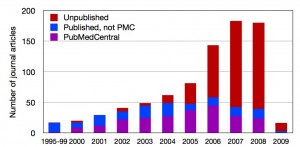
Number of published journal articles per year relating to the complete genome sequences of bacteria and archea
SIGS is a GSC initiative to attempt to bridge this gap, by producing concise peer-reviewed reports that comply with MIGS/MIMS standards, in addition to operation procedures, commentary and review articles. Minimum Information about a (Meta)Genome Sequence (MIGS/MIMS) is a GCS initiative to expand on core reporting standards already established by the International Nucleotide Sequence Database Collaboration (INSDC). MIGS/MIMS is characterized by a standardized checklist that has been published in its entirety in Nature Biotechnology. SIGS will attempt to keep up with data production by offering an accelerated editorial revision workflow, where copy-editing begins almost immediately after initial acceptance.
The e-journal’s goal is to produce 600 publications by June 2011 (approximately 30 per month), by attracting internationally credible authors under a cost-effective model for an open-access journal.
A sample short genomic report was then described, in conjuction with MIGS/MIMS standards. The anatomy of a report included a abstract and introduction (a), genetic sequencing information (b) genome properties (c) and comparisons with previously sequenced genomes (d). Lastly, conclusions and references (e).
References
July 13, 2009 Comments Off on An Open-Access, Standards-Supportive Publication that Rapidly Disseminates Concise Genome and Metagenome Reports in Compliance with MIGS/MIMS Standards: the Session Blog
Copenhagen Business School Library offers OCS as Conference Management System to Their Faculty: the Session Blog
Presenters: Kirsten Suhr Jacobsen, Helle Damgaard Andersen, Peder Lærke Nielsen
July 9th, 2009 at 3:00 pm
Helle Andersen has managed the Copenhagen Business School‘s webservices since 1999, including the main CBS page and related services such as the open conference system (OCS). Kirsten Jacobsen has managed several international conferences hosted by CBS. Together with Peder Nielsen, the library IT department leader, CBS offers conference management system OCS as part of the schools public web system.
Session Overview
The CBS has approximately 15,000 students and 1,000 staff making it one of the largest institutions in Northern Europe. The school understands that conferences are a possible forum to attract investment, scholarship and students. In turn, a professional conference system, may attract an increasing number of conferences to Denmark.
To help this initiative, the university has allocated 3 years of funding for a conference Secretariat at CBS. A large number of conference management systems (CMS) were considered, and OCS was eventually chosen for being open-source, flexible, exclusively web-based and with a large available community to provide technical support.
OCS is a comprehensive package that addresses the many facets of conference management, from online submissions of relevant content to management of all people involved (from registrants to presenters and organizers). OCS even facilitates development of conference webservices and online discussion forums. In fact, the PKP Scholarly Publishing Conference 2009, was managed using OCS. The system’s main strengthes lies in its flexibility and detailed indexing capactiy, which allows for dealing with multiple conferences simultaneously. OCS 2.0 is originally based on open-source code developed for open journal systems, and the CBS group made several productive improvements through formatting modifications and software plug-ins.
Unfortunately, the CBS group has run into multiple difficulties overcoming template configuration problems (especially with navigation menus), and a large portion of time was spent discussing multiple suggestions for improvement to the core software. Majority of the CBS group’s concerns described issues surrounding formatting, style design, and the lack of descriptors from pull-down menus. Other issues raised included expansion of administrative modules, and further development of OCS documentation and tutorials. CBS has already started this process, and suggested that perhaps resources be pooled with the PKP support group and collaborative documents be published on wikipedia.
Peder Neilsen facetiously commented that it is a “Danish tradition of not talking about what is good, but what could be better.” Certainly the described OCS strengths lay not only in its cost (free), but also in the flexibility conferred by open-source code. Furthermore, OCS users may benefit from accessing not only the development team, but a support group comprising of an international community of fellow users. Certainly, this session highlighted the productive interplay between the open-source software developers (of whom Alec Smecher was present in the audience to represent) and the users. Continual feedback drives steady modifications to the original source-code, new plug-in creations and essentially product evolution.
July 13, 2009 Comments Off on Copenhagen Business School Library offers OCS as Conference Management System to Their Faculty: the Session Blog


